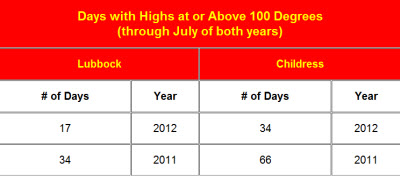July of this year was the hottest July in US history. This heat, as usual, was attributed by some to man-made global warming. Interestingly, this July was substantially cooler than last July in Lubbock where I live.
Go here for all the data. What does this prove? Nothing other than selectively choosing data can give you almost any result you wish. But I thought it would be useful to review a few features of scientific method as applied to climate change. I am not a climatologist, but I am a scientist and scientific method is the same for all branches of science.
First, and this is key, the world is dynamic, not static. This is where so many scientists and economists go wrong. Everything is always changing, sometimes more than others, but always changing. If you look at one variable and assume the others will not change you will certainly be wrong. It is only in the laboratory where it might be possible to control all the variables save the one you are studying.
With respect to climate here are the questions that must be asked if anything meaningful is to result. I will not attempt to answer them in any detail. You can decide for yourself whether the parties to the debate about climate change are asking them and whether their answers appear valid.
1. Is the climate changing? The answer to this one is almost certainly yes because climate like everything else is dynamic.
2. Is it getting warmer? It appears to be.
3. Is the warming trend due at least in part to human activity? Much of the evidence interpreted as holding humans responsible for increased global temperatures is associative. Rising levels of CO2 as are associated with increasing temperatures. The pattern of this rise suggests that it is the result of burning carbon containing fuels. This suggests a causal relationship between CO2 emissions and temperature, but doesn’t prove it. The association could be fortuitous. To prove causation you would have to lower CO2 levels while holding all other variables constant and then show that global temperatures fall. This is an impossible experiment leaving aside its cost.
4. If we assume that human activity is responsible for increased temperatures and if the increase continues what are the effects on the planet? More on this below.
5. What is the cost of stopping the increase in global temperature?
6. Is the result of stopping the increase in temperature worth the expenditure?
When “scientists” try to answer question 4 they often leave science for prophecy. Be suspicious of any scientist who calls himself an activist. The problem with answering #4 is that the world is dynamic. No where is this more true than in science and technology. When climatologists and activists make predictions about what will happen decades hence as the result of global warming they assume that the future’s problem will be dealt with by today’s technology. One can be virtually assured that this view is wrong. Tomorrow’s technology will certainly be vastly more powerful than today’s. It is possible, but surely not certain, that the worst case scenario of climate change will be solved by new technology not yet even imagined.
Consider the example of Thomas Malthus. In 1798 in his An Essay on the Principle of Population he posited that population would increase exponentially and food supply arithmetically and that famine and premature death were inevitable. Of course the reverse happened. His faulty logic was essentially the result of assuming a static world. New agricultural technology resulted in food surpluses vastly beyond anything he could imagine. Incidently the same type of thinking occurs when the Congressional Budget Office is asked to make a projection about the effect of proposed legislation on the economy. They just calculate the result of a single change on a background of a static economy when, of course, any change to the economy always results in changes that ripple over its entirety making the CBO’s analysis correct according to the rules under which it operates, but wrong when applied to reality.
Let’s get back to the weather. We have a series of problems. Will global temperatures rise to levels that seriously impair the planet’s well being? Should we intervene now at great cost to solve a problem that may never arise? And even if it does, will this problem be easily fixed by new technology? All this uncertainty is never reflected in the debates about global temperatures which seem to resemble religious disputes more than scientific arguments. If there is so much uncertainty intrinsic to long term predictions about a subject that is intrinsically resistant to long term analysis, how should we proceed? In general when in doubt, doing dothing is not a bad idea. It also goes against basic human nature.
Any proposal or analysis of climate change that doesn’t ask the basic questions at least similar to the ones above is not serious. Obviously, climate change is a complicated problem that will require us to make very important decisions on the basis of inadequate information. In this regards, it resembles medicine. Regardless, we should place our knowledge alongside our limitations when making decisions which may affect both the physical and economic survival of our planet.









“seem to resemble religious disputes more than scientific arguments.”
……religious zeal of an Elmer Gantry.
………has the scientific community always been so happy to back the unscientific???? The illogical.
The earth has always been changing. What is this worship of staticism???? Species arise and die out. Yet every organism with good public relations gets protected….often to the detriment of essential water and energy projects.